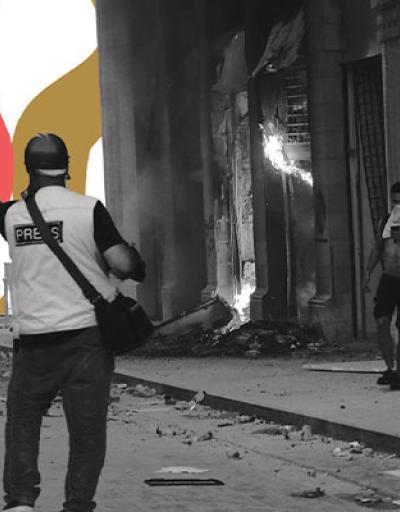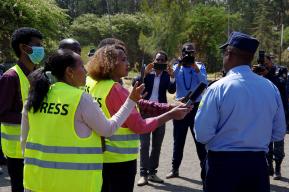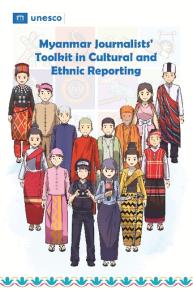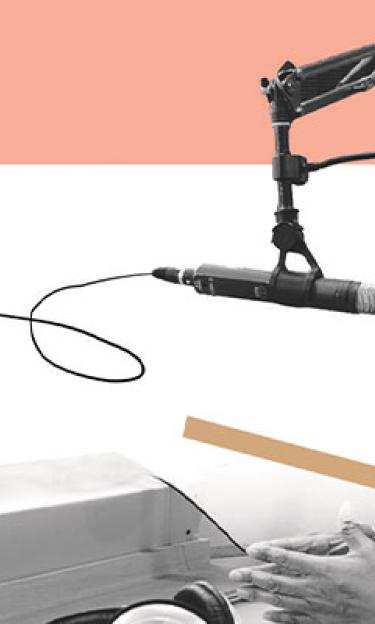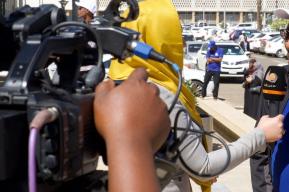It is now 10 years since the UN Chief Executives Board endorsed the UN Plan of Action on the Safety of Journalists and the Issue of Impunity, stating that: “without freedom of expression, and particularly freedom of the press, an informed, active and engaged citizenry is impossible”.
The interagency Plan for the first time provided impetus and funding for a sustained, coordinated framework to address the threats facing journalists. It also recognized how crucial this work was to the delivery of other development objectives:
- democratic governance and poverty reduction;
- conservation of the environment;
- gender equality and the empowerment of women;
- justice and a culture of human rights.
It set out to increase the ambition, cooperation and effectiveness of national, regional and international organizations in working towards a safe and free working environment for journalists.
It has provided a powerful, prominent focal point for international and localized action and has contributed to the adoption of resolutions and declarations by the UN Security Council, the UN General Assembly, the Human Rights Council, the UN Crime Congress, the UNESCO General Conference and by regional organizations. The UN Plan of Action now has a dedicated indicator in the Sustainable Development Goals (SDG 16.10.1), with robust work programmes spanning awareness-raising, monitoring and reporting, academic research, standard-setting and policymaking, capacity-building and coalition-building.
UNESCO spearheads the implementation of the UN Plan, and its work to advance it has been recognized by partners and donors:
Even though the issue of protecting journalists is handled in many UN agencies, it is within UNESCO – with its outspoken mandate of the Communication and Information – that core discussions on development within the area can be held. The Plan of Action provided a framework to keep countries accountable, and having capacity to support duty bearers to fulfil their commitments in the best way.
The UN Plan of Action’s 10th anniversary will be commemorated in Vienna, Austria, in November 2022, following regional consultations, to strengthen and instill new energy in its coalitions and implementation in the face of new and ever-growing threats to journalists and freedom of expression.
Ahead of the commemoration, here’s a list of some key initiatives supported by the MDP which have made possible the progress of the UN Plan of Action on the Safety of Journalists and the Issue of Impunity.
Safety of Journalists
UNESCO delivers numerous projects and global initiatives within its Multi-Donor Programme on Freedom of Expression and Safety of Journalists (MDP) to support Member States to provide a safer environment for journalists.
Through programmes in Palestine, for example, women journalists received training to ensure their physical as well as psychological safety. The campaign #IzharMeraHaq (express my right) in Pakistan engaged thousands on social media to exercise their rights to freedom of expression and understanding of access to information.
High profile survivors of attacks on women journalists, online and offline, including Maria Ressa and Carole Cadwalladr were featured in The Chilling – a prominent research paper from UNESCO and the International Center for Journalists which Sweden says represented an important contribution to ‘global knowledge’ – outlined the scale and level of online violence against women journalists. It revealed that a staggering 73% of women journalists have experienced violence online.
World trends in freedom of expression and media development
Despite huge progress, media workers continue to be killed, detained, attacked and intimidated. UNESCO’s Observatory of killed journalists recorded 455 killings of journalists between 2016 and 2021. This work is therefore more important than ever, and UNESCO has sounded the alarm on persistently high impunity rates for journalist killers. The World Trends Report in Freedom of Expression and Media Development, which is supported by the MDP, shone a light on how independent journalism – the kind that favours public interest over political commercial or factional interests – is in peril. The 2021/2022 edition of the World Trends Report also revealed that 87% of cases of killings of journalists recorded between 2006 and 2020 remain unsolved.
The MDP has supported national events and campaigns, particularly in commemoration of the International Day to End Impunity for Crimes Against Journalists, aimed at reinforcing partnerships and advocacy and strengthening political commitment towards the creation of a safe environment for media workers.
The Hague Commitment to increase Safety of journalists
Close to 60 countries became signatories of the The Global Drive for Media Freedom and Safety of Journalists. Pledges included:
- implementing the commitments contained in the UN Action Plan;
- preventing, investigate and prosecute violence against journalists nationally;
- reporting on progress under the SDG national review processes;
- responding to requests from UNESCO’s Director General on the judicial status of enquiries into journalists killed on their national soil; and
- undertaking independent investigation and prosecution of all forms of online and offline crimes against journalists and media workers.
There cannot be a participatory democracy, or a vibrant civil society, if journalists cannot do their work without being threatened, marginalized or even killed. It’s one of the very few jobs in the world where if you do your job normally you can get killed. And that is something which for us is wholly unacceptable.
All participating countries signed the joint-communiqué that expressed deep alarm at “the targeted killings, threats, intimidation, harassment, unlawful detention and legal pressure against journalists and media workers, including through domestic legislation, in an effort to silence them, as well as the prevailing high rate of impunity for attacks against journalists, as reflected in the UNESCO Director-General’s Report on the Safety of Journalists and the World Trends Report on Freedom of Expression and Media Development.”
UNESCO has signed 6 Memoranda of Understanding with regional human rights courts and international institutions between 2018 and 2021:
- The African Court on Human and Peoples’ Rights
- The Inter-American Court of Human Rights
- The ECOWAS Court of Justice
- The Ibero-American Association of Public Prosecutors
- The International Association of Prosecutors
- The Brazilian School of Judges
Global Drive for Media Freedom and Safety of Journalists
Alongside the Hague Commitment, the Netherlands announced 7 million Euros of funding for the issue – funding which underpinned the subsequent Global Drive for Media Freedom and Safety of Journalists initiative, which was launched at the 2021 World Press Freedom Conference.
This initiative sets out to persuade more countries to use and implement existing international standards. “We very much hope that many more countries will answer this call” said Bahia Tahzib-Lie, Netherlands Human Rights Ambassador.
The Global Drive is jointly implemented by UNESCO and the Office of the United Nations High Commissioner for Human Rights (OHCHR), marking a new level of collaboration between the two agencies.
on human rights standards
UNESCO is employing these funds to upscale the agency’s existing Multi-Donor Programme on Freedom of Expression and Safety of Journalists – which has active workstreams in 30 countries, focusing efforts on Prevention, Protection and Prosecution, three key routes to ensuring journalists can work without duress. Special attention is paid to women journalists, access to information and ending impunity for crimes against journalists.
The funding is also expanding its training courses for legal professionals. Since 2013, UNESCO and partners have trained over 23,000 judicial actors (including judges, prosecutors and lawyers) worldwide on international and regional human rights standards, including on the safety of journalists. This includes regional trainings that have already been delivered across Africa and Latin America & the Caribbean, and, beginning in June 2022, there will be the first regional training for judges across the Arab Region.
It is also training law enforcement officers, who are often unfamiliar with the importance of press freedom, or how to prevent politically motivated attacks on media workers. OHCHR is directing funds to country and regional offices to increase impact on the ground, especially during elections, protests, and armed conflict.
We commend UNESCO’s work on the training of judges and judicial actors to protect the right to freedom of expression. This is an important part of the fight against impunity for crimes against journalists and for ensuring the legal protection of journalists.
Secondee Programme
The Norwegian Government has not only provided direct funding through the MDP, but also an in-kind contribution by pioneering a secondee programme since 2010 that has seen communications and information experts deployed in countries undergoing or recovering from crises. The scheme is a collaboration with Norwegian Capacity, a government-funded branch of the Norwegian Refugee Council. Under the programme, professionals have been seconded to UNESCO Offices in Ethiopia, Lebanon, Pakistan, Haiti, Kenya, Liberia, Libya, Myanmar, Somalia and South Sudan.
Lydia Gachungi is currently deployed as Regional Adviser on Safety of Journalists based at the UNESCO Liaison Office to the African Union and UNECA (The United Nations Economic Commission for Africa) in Addis Ababa, Ethiopia.
There is no doubt that my deployment has helped UNESCO take the lead in significantly putting press freedom and the safety of journalists on the national, regional and international agenda, through a multi-stakeholder approach. It has also contributed to the creation of awareness about media legislation, safety of journalists and the issue of impunity in Eastern Africa.
Other key achievements of the secondee scheme in Africa alone include the African Union hosting its first global media forum; the replication of the Council of Europe (CoE) platform on Promoting Journalism and SoJ in Africa; the creation of national coordination mechanisms for safety of journalists; and the positioning of UNESCO
as the lead UN agency on freedom of expression, safety of journalists and media freedom and development in Africa. This was achieved through the coordination of national media sector working groups, the facilitation of media forums such as the One UN in Kenya, or the launch of the World Trends Report.
Multi-Donor Programme for Freedom of Expression and Safety of Journalists (MDP)
The MDP serves to further strengthen UNESCO work at a global, regional, and national levels, by channeling funds towards emerging priorities and the most pressing needs to achieve its mandate on freedom of expression. It enables UNESCO Communication and Information Sector to address complex issues through the design and implementation of holistic medium and long-term interventions at national, regional and global levels. The clear advantage of this mechanism is that it allows UNESCO and its partners to achieve greater impact and sustainability, whilst reducing fragmentation of activities in the same field.


